Certification vs. Licensure in Chaplaincy: What You Need to Know


Chaplaincy is a vital component of spiritual care in diverse settings such as hospitals, military, correctional facilities, and community organizations. As the profession grows, understanding the distinctions between certification and licensure becomes essential for individuals aspiring to serve as chaplains and for organizations seeking qualified personnel. This article explores key differences, requirements, pathways, and the significance of these credentials in the field of chaplaincy.
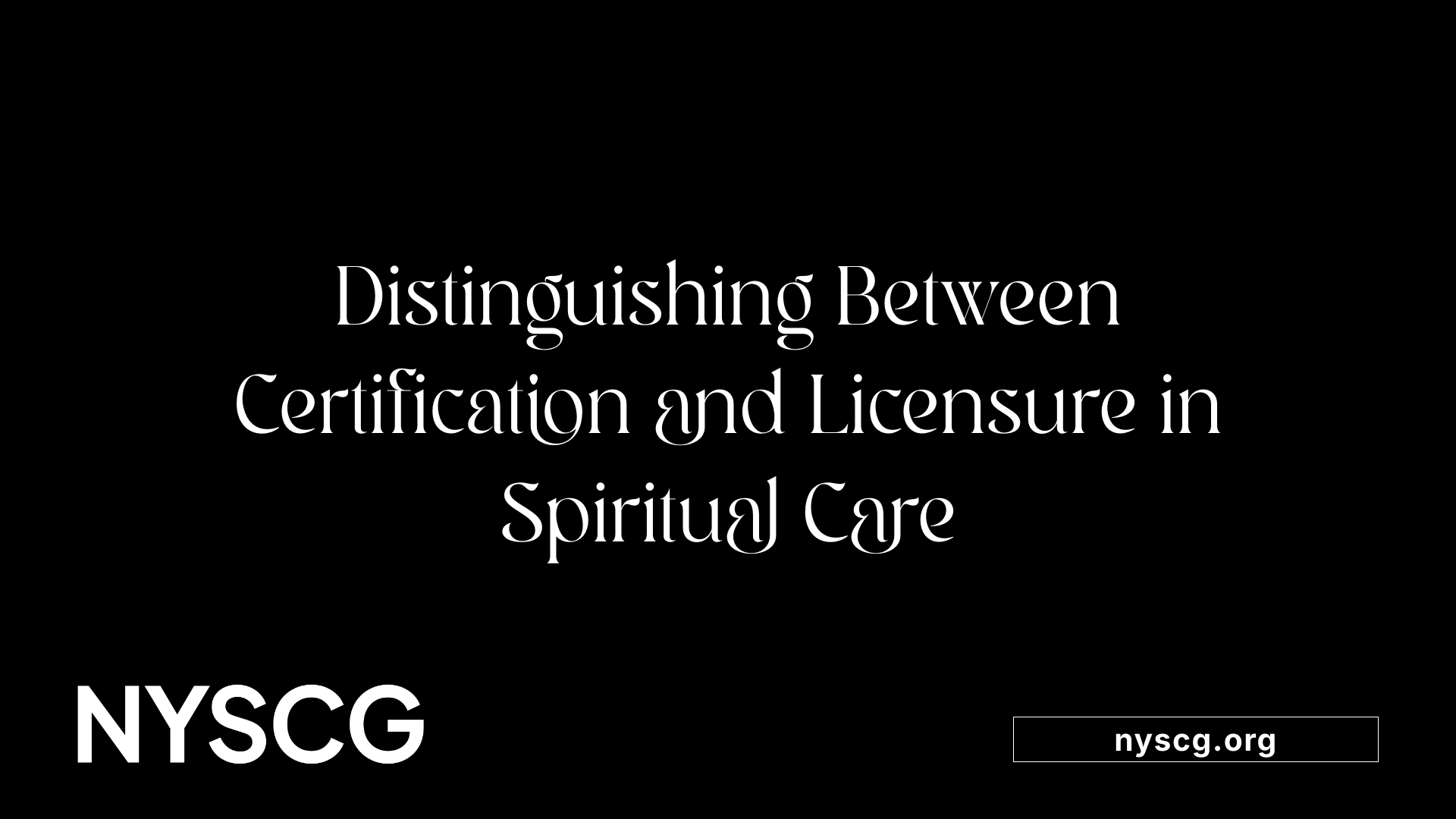
In the field of chaplaincy, understanding the distinction between certification and licensure is essential for both professionals and those seeking spiritual care. Certification is a voluntary process that recognizes a chaplain’s professional competence, ethical adherence, and adherence to established standards. Certification programs, such as those operated by the Board of Chaplaincy Certification, Inc. (BCCI) or the Spiritual Care Association (SCA), set high educational, training, and experiential benchmarks.
Candidates typically must hold advanced degrees in relevant fields like Theology, Philosophy, or Psychology, complete Clinical Pastoral Education (CPE), and gather a minimum of 2,000 hours of work experience. Their competence is then evaluated through written materials, exams, and interviews by peer committees. Certification attests to a chaplain’s qualifications and is often required by employers, especially in healthcare, military, or institutional settings.
Licensure, on the other hand, is a legal process governed by state or local authorities. It grants the official right to practice as a chaplain within a specific jurisdiction and is usually mandatory for providing clinical or counseling services legally. Unlike certification, licensure focuses on ensuring that practitioners meet the statutory requirements set to protect the public and uphold safety standards.
| Credential Type | Purpose | Scope | Recognition | Authority |
|------------------|---------|--------|--------------|---------|
| Certification | To verify professional competence and adherence to ethical standards | Voluntary; recognition within the professional community and often required by employers | Recognized nationally and within clinical settings | Not a legal license but often a career requirement |
| Licensure | To legally authorize practice within a jurisdiction | Mandatory if providing certain clinical or health-related services legally | Legally recognized by state or local government | Legally mandated; grants legal authority to practice |
| Summary | Certification affirms a professional’s skills and ethical integrity, whereas licensure provides legal permission to work in the field.|
Understanding these distinctions helps future chaplains navigate the requirements necessary for their career paths. Certification ensures a high standard of professional competence, while licensure grants the legal right and authority to practice—both are vital components of a chaplain’s professional journey.
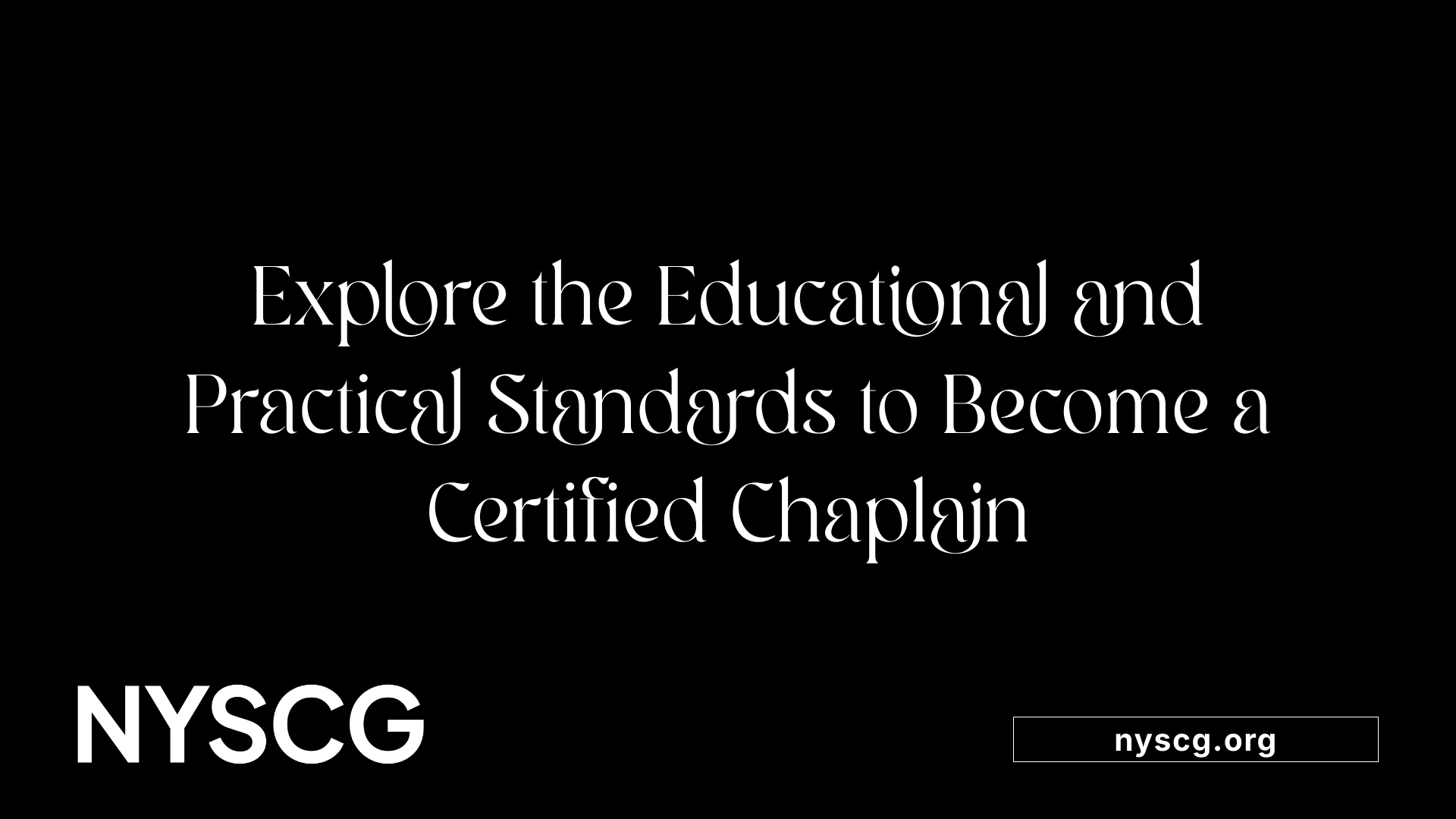
Becoming a certified chaplain involves meeting several educational, experiential, and ethical standards to ensure professional competence. First, candidates must secure endorsement from a recognized faith group or religious organization. This endorsement confirms that the applicant’s spiritual and doctrinal commitments align with their intended ministry.
Educational prerequisites include earning at least a bachelor’s degree from an accredited institution, often in fields like religion, theology, psychology, or counseling. For higher certifications such as Board Certified Chaplain (BCC) or Associate Certified Chaplain (ACC), candidates need a master’s degree in Theology, Philosophy, or Psychology, with a specified credit hour requirement—typically 48 semester hours for ACC and 72 for BCC.
Clinical Pastoral Education (CPE) is central to certification. Applicants are required to complete accredited CPE units—generally four units for BCC and two for ACC—to gain practical pastoral skills. These units involve supervised training in clinical settings such as hospitals or hospice organizations, following standards set by recognized accreditation bodies.
Post-CPE, candidates must log at least 2,000 hours of work or volunteer experience as a chaplain. This work experience must be performed after completing the required CPE units and is essential to demonstrate real-world application of pastoral skills.
Assessment is comprehensive. Candidates submit written case studies, spiritual essays, and documentation of ongoing faith endorsement. They also undergo exams, role plays, and interviews conducted by peer review committees. These evaluations assess knowledge of various religious traditions, pastoral care competencies, ethical standards, and professionalism.
Throughout this process, maintaining high ethical standards is mandatory. Certification bodies like the Association of Professional Chaplains and the National Association of Catholic Chaplains enforce strict adherence to their codes of ethics and conduct.
In summary, chaplaincy certification rests on a foundation of accredited education, practical training, verified experience, and rigorous assessment. These standards safeguard the quality and integrity of spiritual care providers, aligning with national guidelines and recognized professional organizations.
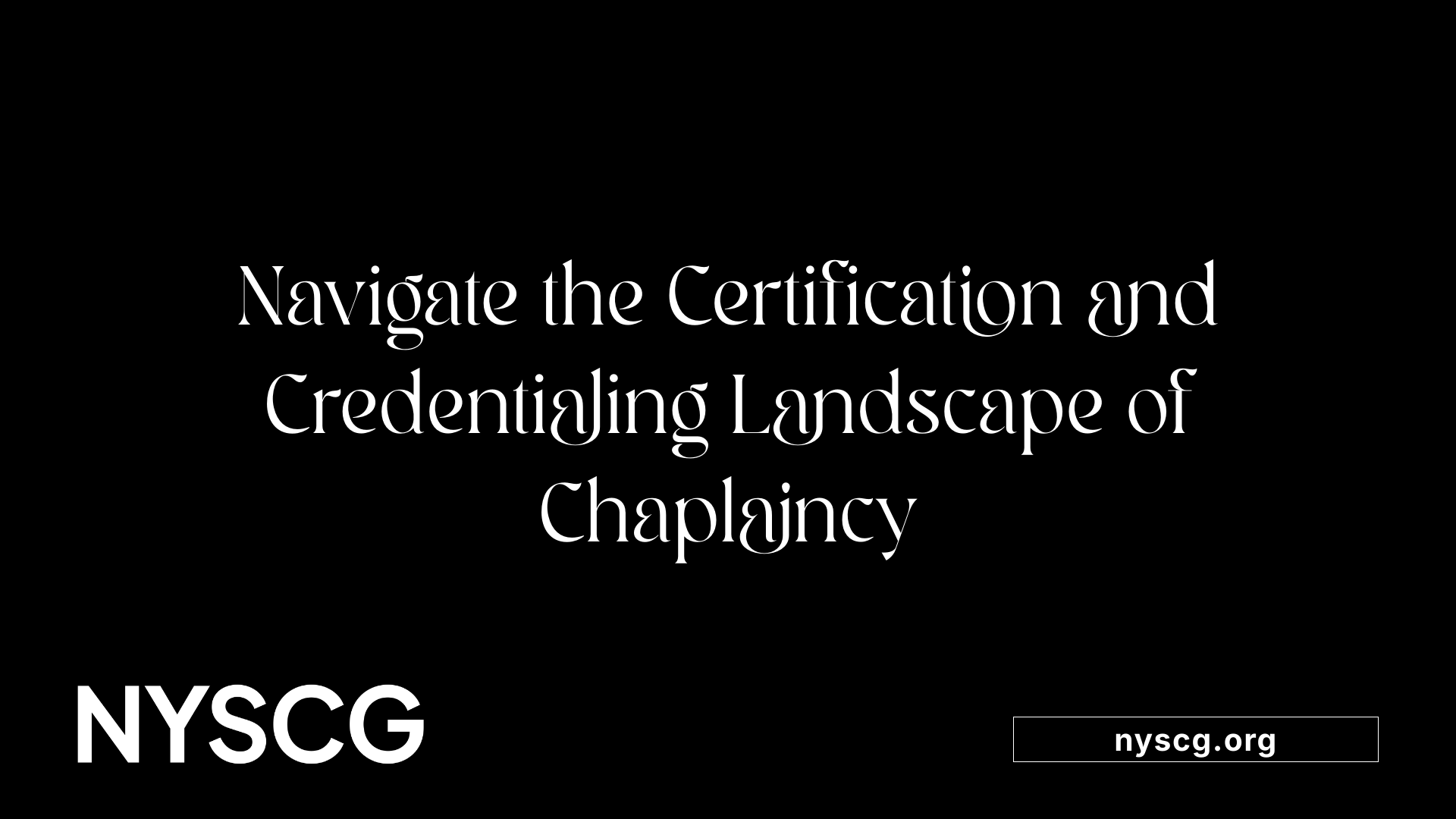
The journey to becoming a certified chaplain involves a systematic and thorough application process. Candidates begin by submitting their applications through an online portal provided by certifying organizations such as the Association of Professional Chaplains (APC), the Board of Chaplaincy Certification, Inc. (BCCI), or the Spiritual Care Association (SCA).
Applicants must furnish comprehensive documentation demonstrating their educational background, including degrees from CHEA-accredited institutions, as well as evidence of clinical pastoral education (CPE) units—usually four for Board Certified Chaplains (BCC) and two for Associate Certified Chaplains (ACC). Additionally, they need to show proof of work or volunteer experience totaling at least 2,000 hours post-CPE.
The review process involves a multi-layered assessment of the candidate's professional competence. This includes evaluation of written case studies, essays on spirituality, and verification of endorsements from recognized faith groups. A face-to-face interview with a peer committee is also required, during which the applicant's knowledge, skills, and ethical standards are scrutinized.
Governing organizations such as the APC, BCCI, and SCA set and uphold high standards for certification. They establish rigorous benchmarks covering chaplaincy skills, ethical conduct, and ongoing professional development. The organizations also administer standardized tests and competency examinations similar to health care licensing, ensuring that certified chaplains are well-prepared for diverse pastoral care roles.
Provisional certifications like PBCC and PACC are available for candidates who meet most certification criteria but need to gain additional experience or training within a two-year window. These interim credentials allow candidates to begin practicing while completing remaining requirements, fostering continuous growth and professional readiness.
Overall, the certification process emphasizes ethical integrity, competence, and continual learning—ensuring chaplains are equipped to serve in complex, sensitive environments such as hospitals, military settings, and correctional facilities.
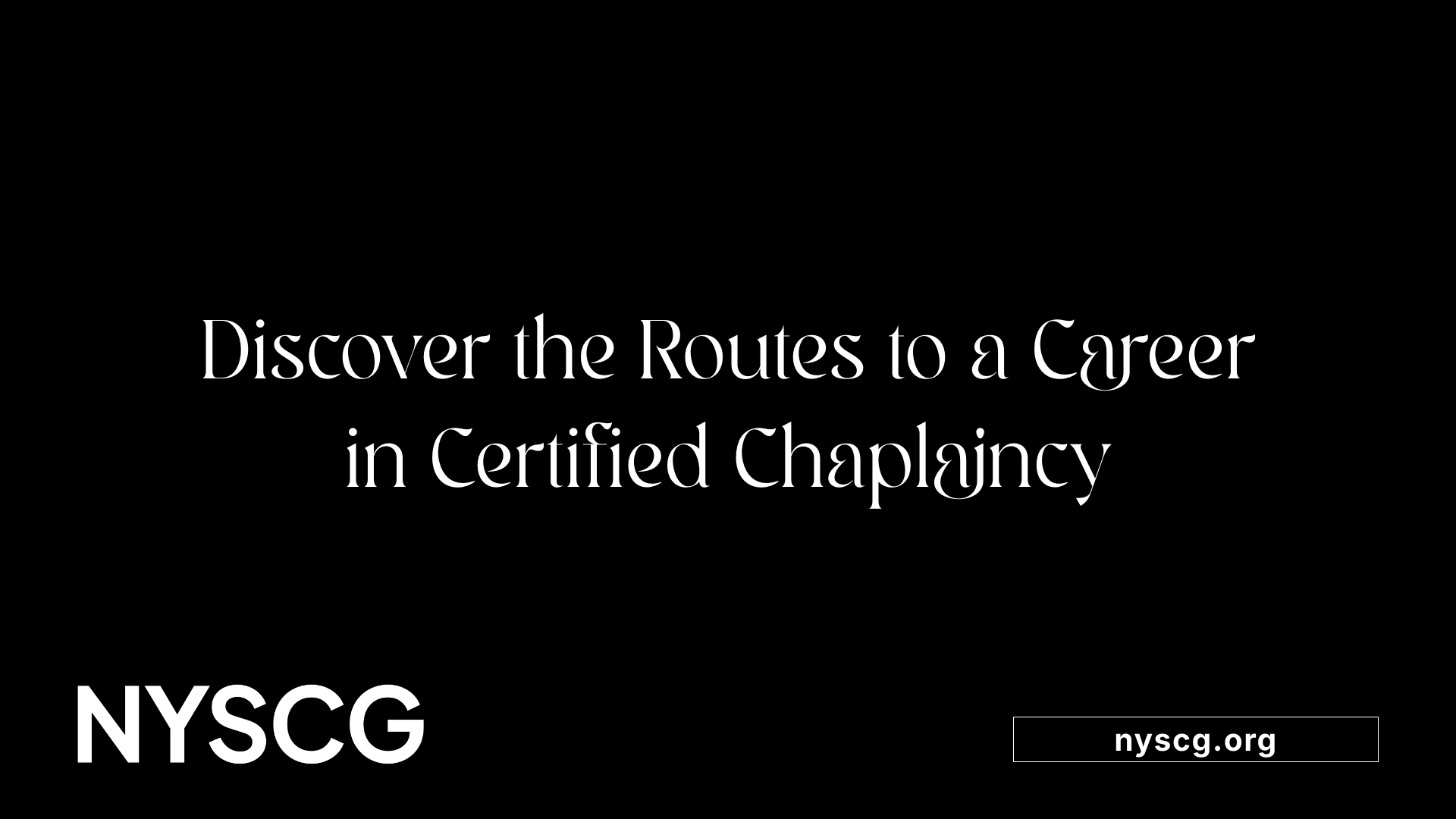
Becoming a certified chaplain involves a combination of educational qualifications, practical training, and professional development. First, candidates usually earn a master's degree in fields like Theology, Religious Studies, or Psychology from an institution accredited by the Council for Higher Education Accreditation (CHEA). This educational foundation provides the necessary scholarly background for chaplaincy.
Following their academic training, candidates complete Clinical Pastoral Education (CPE), which is often composed of four units from recognized providers such as the Association for Clinical Pastoral Education (ACPE), the National Association of Catholic Chaplains (NACC), or the National Association of Jewish Chaplains (NAVAC). This practical training is essential for developing hands-on pastoral care skills.
After completing CPE, aspiring chaplains typically accumulate a minimum of 2,000 hours of work or volunteer experience in chaplaincy roles. These hours allow candidates to demonstrate their ability to provide spiritual support across various settings, such as hospitals, military facilities, or correctional institutions.
Ongoing professional development is critical for maintaining certification. Many chaplains participate in additional certifications, attend workshops, and engage with professional networks. These activities enhance their skills, keep them updated on ethical standards, and support their growth in the field.
In addition, endorsements or ordinations from faith traditions often serve as a prerequisite for certification with organizations like the Board of Chaplaincy Certification, Inc. (BCCI) or the Association of Professional Chaplains. These steps collectively ensure that chaplains meet high standards of education, competence, and ethical conduct, preparing them for impactful spiritual care in diverse environments.
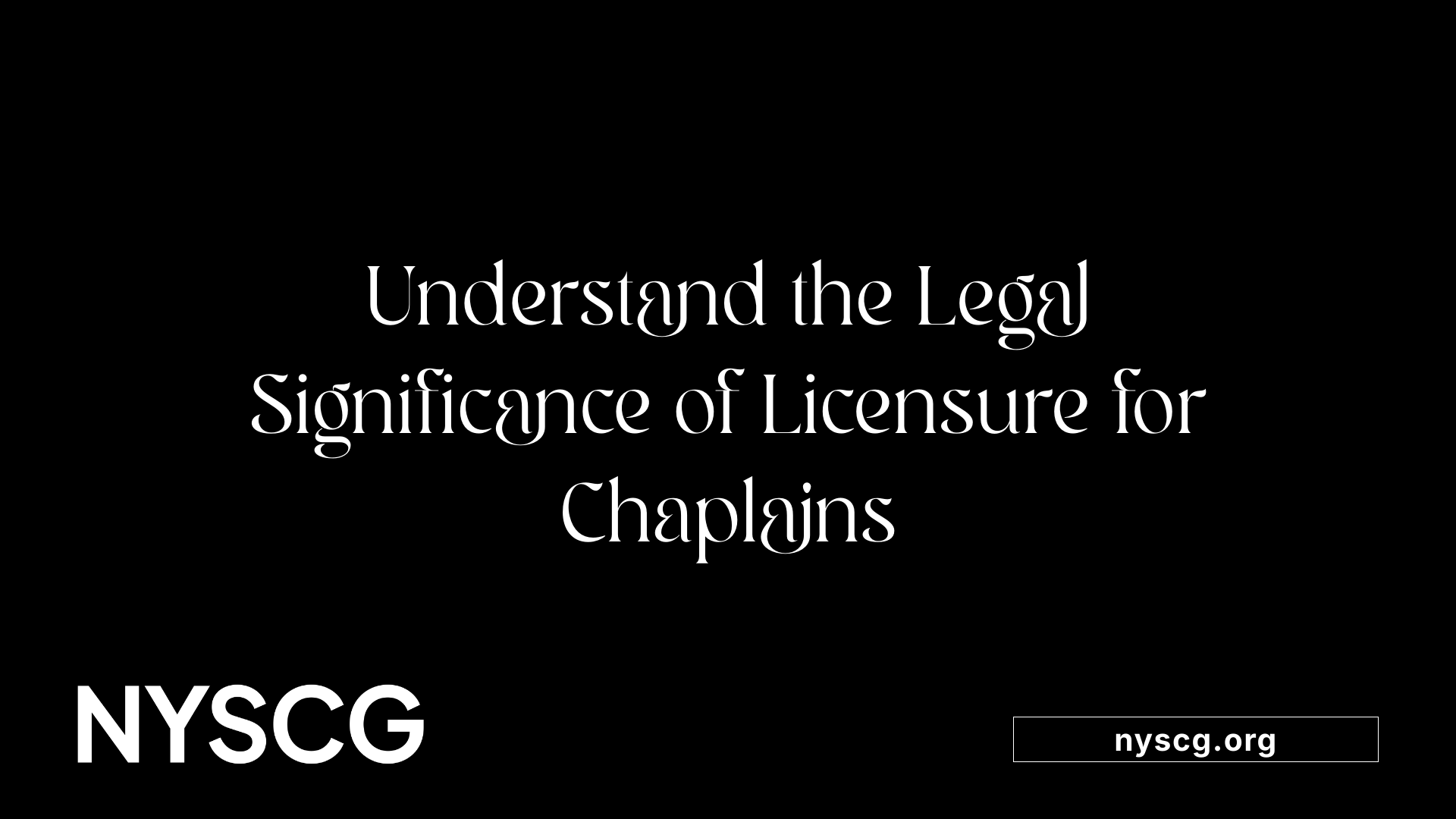
Licensure plays a crucial role in the professional landscape of chaplaincy. It provides legal authority to practice within specific jurisdictions that mandate such regulation, ensuring chaplains operate in compliance with local, state, or federal laws.
Having a license enhances a chaplain's professional credibility and public trust. It affirms that the individual has met the necessary qualifications, standards, and ethical guidelines mandated by licensing boards or authorities.
Licensure often works in conjunction with certification, which demonstrates ongoing competence, ethical practice, and commitment to professional development. Together, they ensure that chaplains deliver high-quality spiritual and emotional support.
This official recognition is especially important when chaplains serve in complex or sensitive environments such as hospitals, military settings, and correctional facilities. It allows them to access these spaces with assurance of their legal standing.
Moreover, licensure requirements typically include specific educational credentials, supervised experience, and examinations. These standards help maintain the integrity of the profession and protect the public from unqualified providers.
In summary, licensure helps establish clear guidelines, supports accountability, and elevates the status of chaplains as recognized healthcare and community providers. It facilitates effective service delivery, especially during crises or in regulated environments, and underpins the professionalism necessary for contemporary spiritual care.
Understanding the differences between certification and licensure is crucial for aspiring and practicing chaplains. Certification affirms professional competence and ethical adherence and is usually voluntary, provided by a recognized certifying body. Licensure, on the other hand, is a legal requirement that varies by jurisdiction and is essential for legal practice. Both credentials play complementary roles in ensuring qualified, ethical, and effective spiritual care across diverse settings. As the field continues to evolve, staying informed about these distinctions and requirements will support chaplains in their professional growth and legitimacy.
All you need is the will to make the world a better place.
New York State chaplain group inc. is a tax deductible organization with a federal tax Id number 92-383-4921